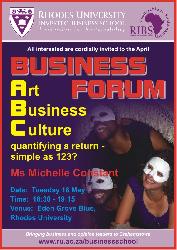
Michelle Constant, CEO of Business and Arts South Africa (BASA), delivered a vibrant, yet hard-hitting address that challenged the audience to change mind-sets in terms of investment in the arts at this week’s Rhodes Investec Business School (RIBS) Business Forum.
Creativity, in Constant’s opinion, is a critical skill needed by all job sectors, as are good communication skills. “Creativity is a major driver of socio-economic development.” She therefore urged Business Schools to look into partnerships with the arts to promote this.
BASA is a Section 21, not-for-profit company that researches, supports and lobbies business investment in the arts in South Africa. They service 160 corporate members and try to set up equitable partnerships that meet the needs of all the parties concerned.
Constant stressed the need for new measurements to be introduced that take into account both quantitative and qualitative impact, as benefits from the arts are often less quantifiable than those from other areas such as sport. She said the challenge was to find ways to increase the economic value of the arts as well as to show that the arts are an integral part of society, not something apart.
In response to a comment from an audience member, who pointed out that South Africa has many pressing issues that take centre stage, e.g. HIV/AIDS, unemployment, poverty, etc, Constant said people had to realise that, “Creativity is a major driver of socio-economic development”.
BMW were cited as a good example of how a relationship between business and the arts can be mutually beneficial. The company recently held two art exhibitions on the floor of their showroom in Johannesburg and then treated potential clients to a breakfast, massage and a tour of the showroom. Their car sales grew exponentially and more paintings were also sold. It became a win-win situation.
Constant referred to a new book by Stuart Theobold entitled “Sport vs Art”, but said the two need not necessarily be mutually exclusive or in competition with each other. There are even instances of sport supporting art, e.g. the advertising of theatre productions at the “Shark Tank” (ABSA Rugby Stadium in Durban).
Another strategy would be to recruit students from the arts into the MBA course and not just those from commerce. “It would make for a society of Renaissance citizens,” she said.
Also on the BASA agenda is a drive to promote the concept of philanthropy in South Africa, something they feel is currently lacking in this country. They have introduced a new award this year, entitled “Champion of the Arts”, in the hope of encouraging executives to support the arts and be acknowledged for it.
The bottom line seems to be that those involved in the arts need to think of new and creative ways (and for artists that shouldn’t be too difficult!) to establish partnerships and prove return on investment. In Constant’s words: “We need to become arts activists.” In a city that hosts the National Arts Festival, that seems appropriate.
